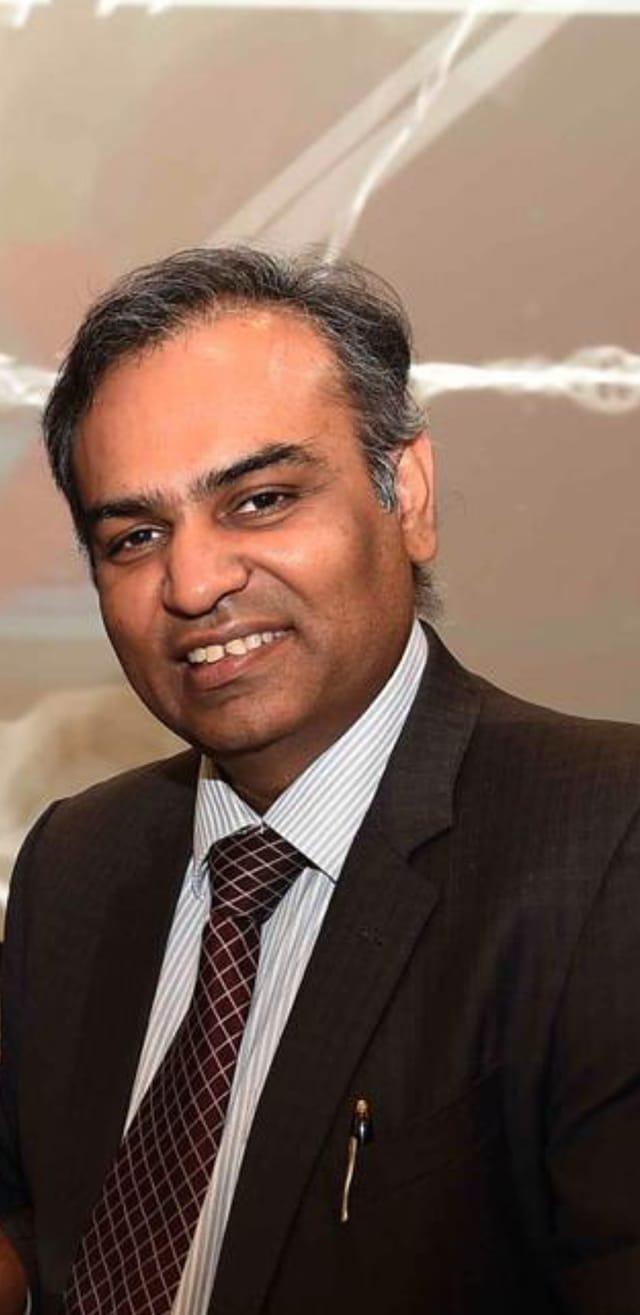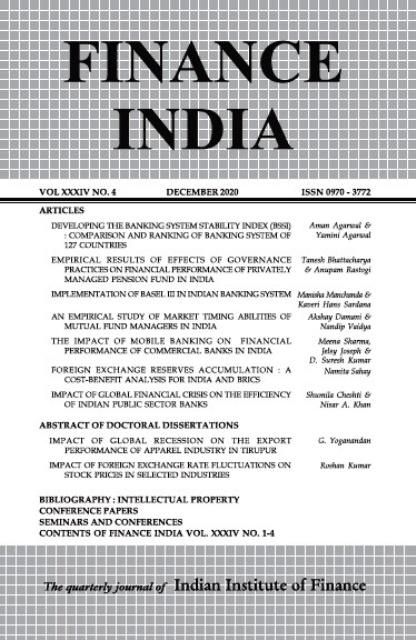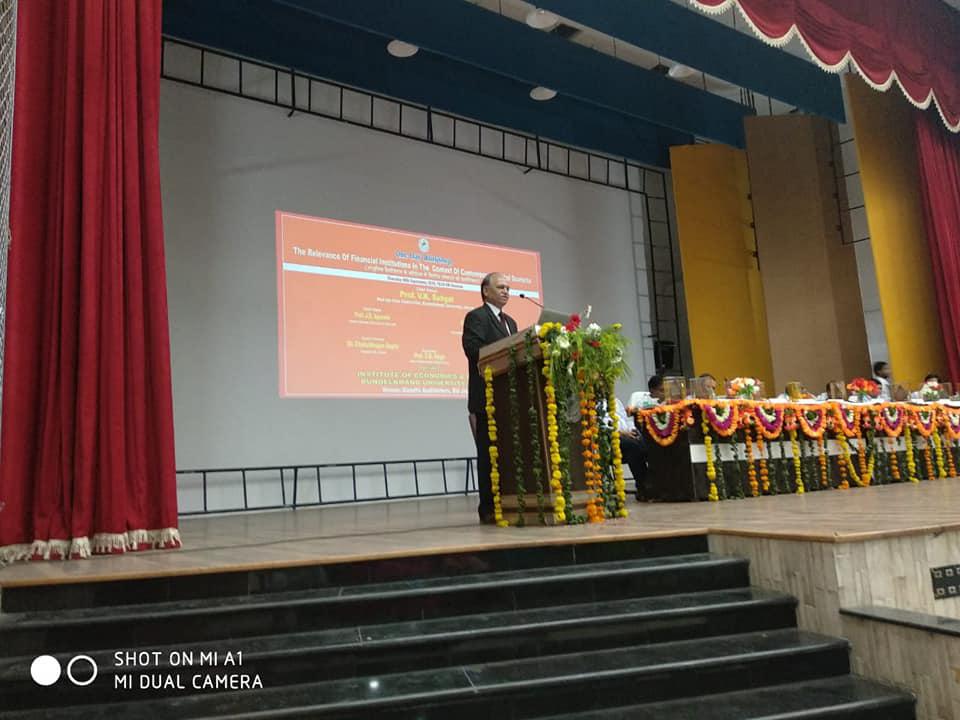Press release
Banking & Financial Institutions in India Need to be Technology driven in the context of Global Scenario : Dr. J.D.Agarwal
Financial institutions need to be technology driven to meet the needs and challenges of the economy in the next few years to follow the international trends said Professor J.D. Agarwal while delivering a Key Note address as chief guest, on Relevance of Financial Institutions in the context of contemporary Global Scenario at Bundelkhand University, Jhansi. The conference was chaired by Professor V.K. Sehgal, Vice Chancellor of the University and organised by Professor C.B. Singh, Head Dept of Banking, Economics and Finance.He emphasized the pivotal role played by Financial Institutions and new trends in the banking sector in the context of global scenario. Prof. Agarwal said that the Indias Currency Regime dates back to 1,000 BCE. Despite the pivotal role of financial institutions, there is a lot of hue and cry and rightly so, for the mounting NPAs, dwindling financial position of banks and financial Institutions in India, exposure of massive scams recently and the requirement of BASL Norms IV
According to him the India has one of the best system of financial institutions to meet the needs and requirements of different sections of society, individuals, trade and industry unlike universal banks performing all tasks, as exist in United States. Its financial Institutes divided in different categories constitute of Reserve Bank of India, Commercial Banks including private, public, foreign banks, Regional Rural Banks and cooperative Banks; Development Banks like IDBI, ICICI, IFCI, SIDBI, SCICI and IRBI; Specialized and sectoral financial institutions like TFCI, TDICI RCTC, EXIM Bank, NABARD ; Investment Institutions like UTI, LIC, GIC and State Level financial Institutions like SFCs, SIDCs etc. The banks and financial institutions have played a pivotal role in the development of the country, mobilizing savings and giving boost to investment in the country. The different categories of financial institutions have helped mitigate any serious crisis of the type which affected Europe and USA in the recent past said Dr. Agarwal.
Prof. Agarwal welcomed the government decision on Post Office Banking suggested as part of financial inclusion to reach people from far flung areas of India. He also advocated the need for Banking on Wheels and pure online banking in the country; He also deliberated on the need for Agro Banking (including Kissan Credit Card and Corporate Farming); Education Banking; Micro Banking; Islamic Banking; Healthcare Banking and Skill Banking in the country. According to Prof. Agarwal, Mobile Banking; Virtual Banking / Financing; Developmental Banking; Retail Banking in Key Cities; Corporate Banking; Cooperative Banking will be new trends in Banking tomorrow.
The banking sector has been resilient to the global financial crisis. However, India continues to struggle with ever rising burden of Non-Performing Assets in the banking sector. Indian banks' gross non-performing assets (NPAs), or bad loans, stood at Rs 10.25 lakh crore as on 31 March 2018. This accounts for 11.8 percent of the total loans advanced by banks. Given the alarming condition, the government last year announced Rs 2.11 lakh crore bank recapitalization plan for state-run banks.
Speaking on the future trends in banking in the global scenario he said that there is need to continuously upgrade the financial institutions technologically by 2030 in the wake of mounting serious pressure on Financial Institutions to perform and advance credit to sectors to propel growth. According to him, Consumers will need banking services, but they may not turn to a bank to get them or the definition of a bank may change for people as the technological advancements change the paradigm of banking. As the sharing economy takes over like in case of Ola, Ubers, Airbnb, it is likely to change the paradigms of financial services too. Sharing economy in the banking space would mean decentralized asset ownership using information technology to find efficient matches between lenders and borrowers domestically and across border rather than approaching a bank as an intermediary. Online platforms already provide information and financial services at doorstep to consumers said Dr. Agarwal.
According to Dr. Agarwal, Financial Institutions in the present era initiate transactions on the their own capital or borrowed sum putting themselves at risk however it would be soon that the evolution driven by peer to peer transactions with new breed of FinTech would convert these financial institutions as one node in the network. Many such partnerships exist in US, UK and China. There is continuous development of platforms that enable ordinary individuals to raise funds and seek credit lines from retail investors. Apple has filed a patent application for person-to person payments using electronic devices that could allow iPhone users to transfer money more easily. In countries like our where bank branch penetration is very low in the rural areas, banks would seek alternative distribution channels. Like in Kenya, M-PESA handles deposits and payments using customers cell phones and a network of agents. Dr. Agarwal said, Financial institutions in the present world should seriously consider sharing economic opportunities such as partnerships with digital intermediaries or even end users to ensure reduced cost of services to the end consumer.
Professor Agarwal said, the next major technology which is likely to be a big disruptor is the blockchain technology. The blockchain is a decentralized ledger, or list, of all transactions across a peer-to-peer network. Using this technology, participants can transfer value across the Internet without the need for a central third party. Blockchain Technology could make the financial services industrys infrastructure much less expensive and its uses are infinite from financial transactions to automated contractual agreements. Blockchain are relatively less expensive as they remove the overhead of centralized third party that authenticates the transaction. These transactions could include transferring digital or physical assets, protecting intellectual property, and verifying the chain of custody. However, according to Dr. Agarwal, Trust is the biggest challenge for this technology presently. The impediment in accepting the technology involves the knowledge whether public ledger can be hacked, role of crypto currencies and crypto products being asset class and their legality in countries, and regulatory challenges in accepting this technology. The relevance of large physical structures relevance of financial institutions comes into question.
According to Dr. Agarwal, in recent years, the banking sector has seen a rapid rise of non-traditional competitors, through alternative payment methods such as gift cards and contactless payments built into mobile operating systems. Banks would want to manage the security, user experience, and customer connectivity at the point of purchase. The more digital a bank goes with a wallet there is likely to be greater real time connectivity for seeking valuable information about the consumer which can be linked to other product streams.
According to Professor Agarwal, Financial Institutions would also have to deal with a new demographics known as millennial who would be targeted through digital channels. The new customers of the banks are found to build wealth by owning small businesses, investments or real estate; in their behavioral approach they use social networks for content, product reviews, opinions and referrals. He said, Financial Institutions would have find ways to target these new groups of customers who would in their buying and selling habits, be very different from traditional consumers.
According to Dr. Agarwal, in life insurance and healthcare services, much is changing in the underwriting processes becoming more collaborative with wearable computing. Data mining and analytics would hold the key for propelling businesses. With digitalization there is easier comparison and faster switching which makes relationship brief and highly competitive said Dr. Agarwal. If Financial Institution do not offer customized services in mortgage, insurance, investment and banking then they would lose customers. Countries like US are using Artificial Intelligence to provide more personalized services. Customer Analytics is likely to be driver for greater customer engagement and satisfaction.
Dr. Agarwal said, Financial Institutions in this fast pace changing technology paradigms is challenged by cyber threats where we find that central banks of countries like Bangladesh have lost tens of millions of dollars to hackers. Under similar threats of security recently SBI blocked 6 lakh debit cards. Even the Nirav Modi scam where there were no cyber threat but with connivance with bank staff the security was breached for several years is a stance to permit guarantees on LOUs need thorough investigation and expose the heavy reliance of banks on technology. According to him, the challenge for financial institutions is to balance security with customer convenience. While investing heavily on technology that protects from cyber crimes, the machinery should not loose focus on gaining grounds with domestic and international consumers.
Prof. (Dr.) J.D. Agarwal, is distinguished Professor of Finance and Founder Chairman, Indian Institute of Finance, Gr. Noida , Delhi NCR.
Indian Institute of Finance
45A, Knowledge PArk III
Greater Noida, Delhi NCR, INDIA
This release was published on openPR.
Permanent link to this press release:
Copy
Please set a link in the press area of your homepage to this press release on openPR. openPR disclaims liability for any content contained in this release.
You can edit or delete your press release Banking & Financial Institutions in India Need to be Technology driven in the context of Global Scenario : Dr. J.D.Agarwal here
News-ID: 1229146 • Views: …
More Releases from INDIAN INSTITUTE OF FINANCE

"Banks should pay interest on monthly basis on Savings Accounts & Deposits of ov …
Prof. Aman Agarwal (Director, Indian Institute of Finance) welcomes the decision of Reserve Bank of India (RBI) to have accommodative stance by keeping the policy (interest) rates unchanged despite the changes in interest rates affected in some of the countries.
Prof. Agarwal in a letter to the RBI Governor, Shri Shaktikant Das and the Finance Minister Shrimati Nirmala Sitaraman, has urged that RBI to consider the payment of interest on…

“Long-term relationship exists between financial development and economic grow …
The economic and financial development in India deserves a well-calibrated policy response said Prof. Naliniprava Tripathy, Professor (Accounting & Finance), Indian Institute of Management, IIM Shillong, while delivering a Webinar on Financial Development and Economic Growth Nexus : Indian Experience organised by IIF College of Commerce and Management Studies, Greater Noida. Her research paper, co authored with Dr. Shekhar Mishra, Assistant Professor, C V Raman College of Engineering, Bhubaneshwar on…

“Commerce and Business Studies open a plethora of career options” : Prof. An …
Commerce is an interdisciplinary subject covering Accounting, Finance, Marketing, E-Commerce, Taxation, Auditing and Management said Prof. Anil Kumar, Professor, Shri Ram College of Commerce, University of Delhi, Delhi, while delivering a Webinar on Opportunities in Commerce and Business Studies organised by IIF College of Commerce and Management Studies, Greater Noida. He further explained that students need to have the skills of analysing numerical data, good communication and problem solving ability…

“Banking System Stability Index (BSSI) proposed to Rank the Banking Systems in …
IIF has developed a Banking System Stability Index (BSSI) to rank the banking systems in different economies. BSSI has been developed using key financial system soundness indicators which then leads to the determination of ranks of the banking Systems in 127 countries worldwide. This is for the first time that such an index has been developed and countries based on their BSSI, have been ranked. All countries have been…
More Releases for Bank
Mortgage-Backed Security Market 2022: Industry Manufacturers Forecasts- Construc …
The Mortgage-Backed Security research report is the professional report with the premium insights which includes the size of the business, the ongoing patterns, drivers, dangers, conceivable outcomes and primary segments. The Market Report predicts the future progress of the Mortgage-Backed Security market based on accurate estimations. Furthermore, the report offers actionable insights into the future growth of the market based on inputs from industry experts to help readers formulate effective…
Doorstep Banking Services Market Challenges and Opportunities in Banking Service …
Doorstep banking is a facility provided so that user don't have to visit bank branches for routine banking activities like cash deposit, cash withdrawal, cheque deposit, or making a demand draft. The bank extends these facilities at user work place by appointing a service provider on your behalf.
This service was earlier available only to senior citizens but it is available to everyone with nominal fee charges, depending on the type…
Payments Landscape in Iran: Opportunities and Risks to 2021- Bank Saderat Iran, …
Payments Landscape in Iran: Opportunities and Risks to 2021
Publisher's "Payments Landscape in Iran: Opportunities and Risks to 2021", report provides detailed analysis of market trends in the Iranian cards and payments industry. It provides values and volumes for a number of key performance indicators in the industry, including payment cards and cheques during the review-period (2013-17e).
The report also analyzes various payment card markets operating in the industry, and provides detailed…
India Retail Banking Market Dynamics 2018 by SBI ICICI, HDFC, Axis Bank, Bank of …
Margins among Indian banks remained high at 6.3% in 2017 in comparison to its peers China (2.8%) and Malaysia (2.6%). The average cost-to-income ratio remained at around 53% during 2013-17, marginally higher than China (50%) and Malaysia (51%). However, there remain large disparities in operating efficiencies within the market. The same is also true for profitability, with large disparities in return on assets figures. This is due to rising compliance,…
Payments Landscape in Iran: Opportunities and Risks to 2021- Bank Saderat Iran, …
Payments Landscape in Iran: Opportunities and Risks to 2021
Publisher's "Payments Landscape in Iran: Opportunities and Risks to 2021", report provides detailed analysis of market trends in the Iranian cards and payments industry. It provides values and volumes for a number of key performance indicators in the industry, including payment cards and cheques during the review-period (2013-17e).
The report also analyzes various payment card markets operating in the industry, and provides detailed…
India Retail Banking Market Dynamics 2018 by SBI ICICI, HDFC, Axis Bank, Bank o …
Margins among Indian banks remained high at 6.3% in 2017 in comparison to its peers China (2.8%) and Malaysia (2.6%). The average cost-to-income ratio remained at around 53% during 2013-17, marginally higher than China (50%) and Malaysia (51%). However, there remain large disparities in operating efficiencies within the market. The same is also true for profitability, with large disparities in return on assets figures. This is due to rising compliance, regulatory, and other…
